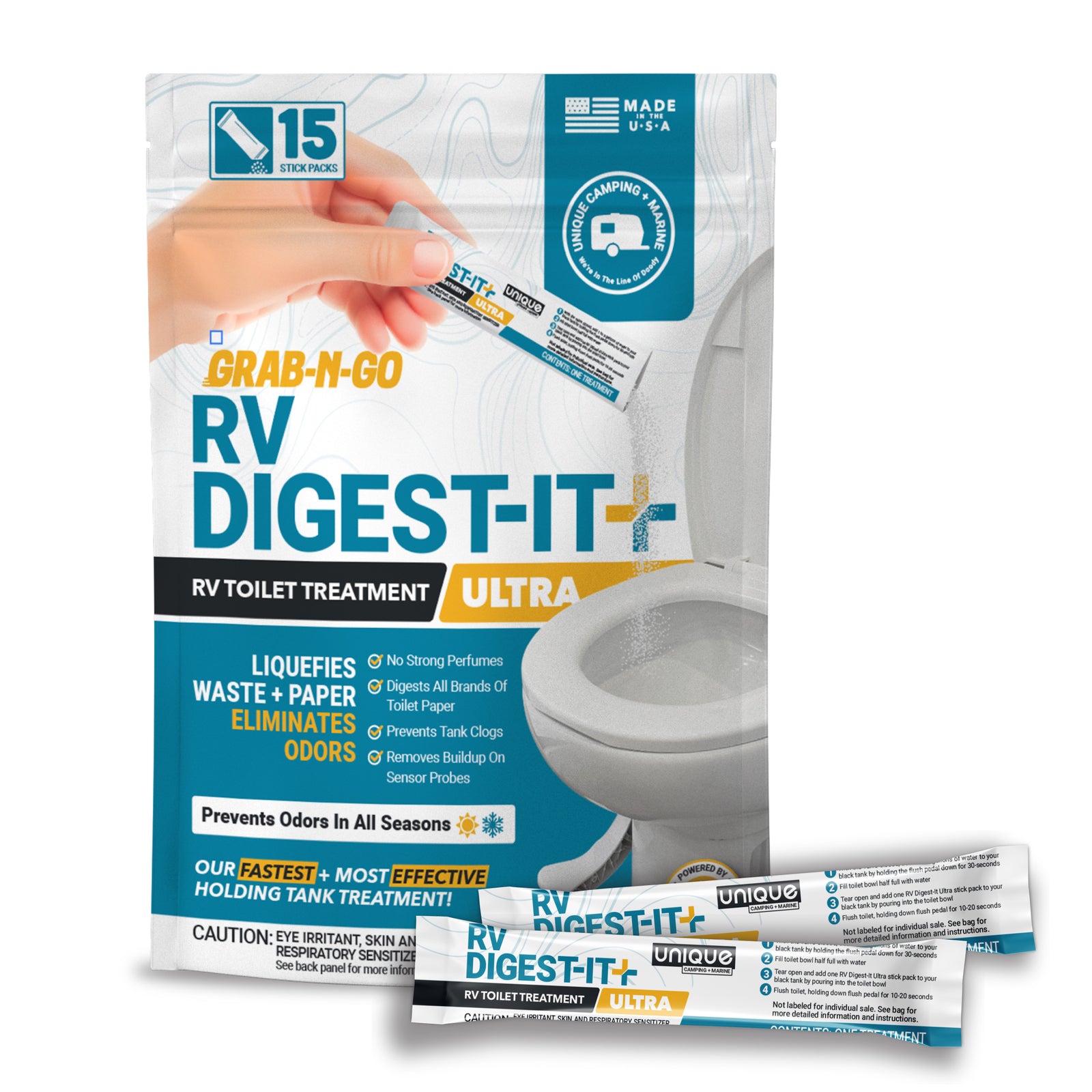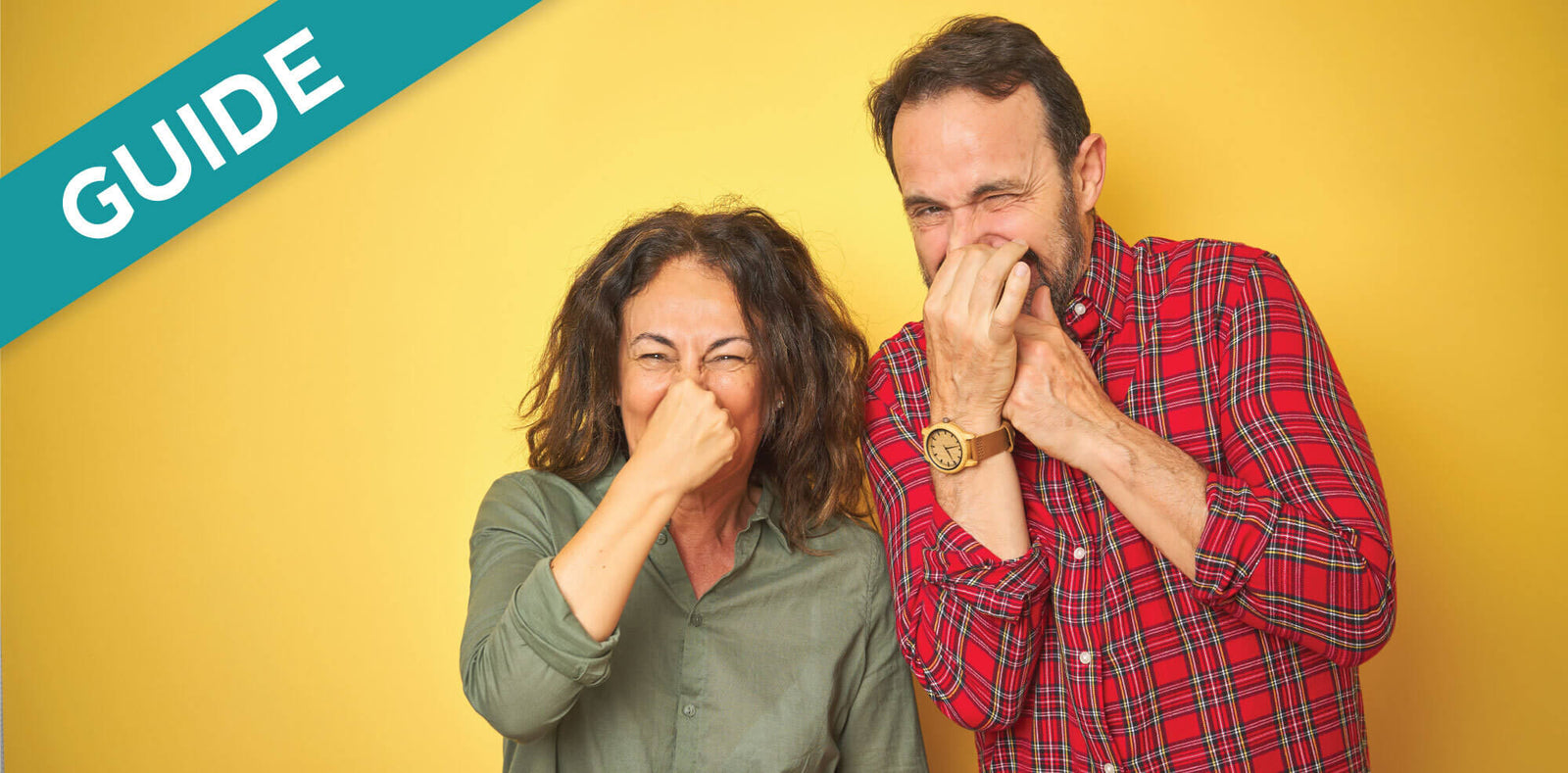
Key Points:
- Odors are more potent in high heat because evaporation causes odor molecules to vaporize and linger in the air.
- Evaporation of water in the black tank will create an exposed mountain of stinky poop and paper above the water line which makes it impossible to control odors.
- Odor-eliminating aerobic (good) bacteria begin to fail or die in high heat, thus allowing stinky anaerobic (bad) bacteria to thrive in the black tank, creating odors.
- If you are treating your black tank with a high quality bacteria AND enzyme treatment, adding more fresh water to a stinky tank will eliminate most odors, quickly.
-
Steps you should take to prevent odors in high heat (temperatures exceeding 85 degrees), include:
- Using more water than usual during periods of high heat
- Confirming that your toilet and black tank seals are in good shape to prevent odors from escaping from the tank and into the RV
- Ensuring your black tank vent is free from blockages and working properly
- Keeping several inches of water inside the toilet bowl to prevent odors from escaping the tank and entering the RV living space
High heat can cause strong RV toilet odors to go from bad to worse in no time. Dealing with these odors is not only frustrating, it can easily ruin an RV trip. Thankfully there are easy solutions that allow you to solve your stinky RV black tank and camp in high heat locations without being flooded with those foul sewer smells. In this article, we’ll briefly review why odors are worse in high heat, and provide some simple solutions on ridding your toasty RV of odors.
What Causes Odors to Increase in High Heat?
Exposed Poop and Paper
Like Newton’s third law (for every action there is an equal and opposite reaction), as heat rises in the black tank, the water evaporates and is reduced. We all know heat causes water to evaporate, so if RV holding tank temperatures rise, water evaporates and begins to expose the poop and paper, that was once underwater, to the air. When that happens, odors become uncontrollable.
Aerosolized Odors
Aside from simple evaporation, heat actually provides more energy to odor-infused liquids to transform into vapors; basically, when liquid vaporizes, odor molecules become airborne and the humidity in the air from the evaporation causes them to linger longer and travel farther.
Heat Helps Stinky (bad) Bacteria Thrive
Heat is something our bodies produce, meaning the odor-causing anaerobic (bad) bacteria that comes from our poop was thriving inside our gut because the temperature of our intestines is a great environment for them. When they are deposited into a hot black tank, it’s like they never left home and continue thriving, giving off their odors.
Wise RVers who use bacteria and enzyme treatments in their tanks know that high heat causes the aerobic (good) bacteria from the treatment to slow down and become less effective, just like humans do when we get overheated. But the stinky anaerobic bacteria love heat because it gives them more energy to continue releasing smells.
So really, heat helps stinky bacteria thrive, and figuratively hamstrings the good bacteria, making it impossible for them to neutralize the odors from the bad bacteria.
Smells Actually ARE More Intense In Higher Temperatures
As if all this wasn’t aggravating enough, heat also causes your nose’s odor receptors to be more sensitive, so as the temperature rises, you can actually smell odors more intensely.
Guide: Why Are Bacteria and Enzymes Good for Your RV Holding Tanks?
Here’s a simple, condensed representation to help you remember the basics of maintaining odor-free tanks while camping in hot weather:
- High heat + low water + stinky bacteria = increased odors
- Moderate temperatures + plenty of water + odorless bacteria = odor-free RV
Knowing why heat causes odors to increase is great, but you want to know how to get rid of those odors when you’re adventuring in the hot outdoors.
How Do I Know When Holding Tank Temperatures Are Too High?
We knew this question would come up, so we conducted some testing of holding tank temperatures and found that when parked on concrete or asphalt, tank temperatures nearly match the outside ambient temperature but were 10 degrees cooler when parked on grass or dirt. This means simply attaching a thermometer on the outside of your RV will give you a pretty solid reference for what your tank temperatures might be.
Our testing has shown that odors become more intense and problematic when temperatures exceed 85 degrees. If it’s 95 degrees outside, that means odors are probably becoming more intense inside your holding tanks, and you need to cool your tanks down.
It’s also important to note that while traveling on asphalt roads (especially at high speeds) the heat created from the vehicle or RV engine will pass under the RV and contribute to even higher tank temperatures, so be aware of this when moving your RV to a new location in high temperatures.
How to Control Odors in High Heat Environments
How you control odors increased by high heat heavily depends on your camping style and your willingness to use certain products. You have some different options when controlling odors in high heat camping situations:
- Use more water in your holding tanks during periods of high heat to keep them cooler and to ensure your waste remains underwater.
- Add more (good) aerobic bacteria and enzymes (like those found in Unique RV Digest-It Ultra) to help counteract the die-off your treatment may be experiencing from heat exposure.
- Dump more frequently.
These are what we recommend for every camping style, but we realize that sometimes the ideal solution doesn’t fit with your camping style. It is important to understand that there is no “magic bullet” for controlling odors.
A Caution To High Heat Boondockers
Simply stated, if you choose to camp in excessively hot temperatures, with extremely low water usage, waiting too long to dump your tanks - YOU ARE GOING TO HAVE TO LEARN TO LIVE WITH ODORS.
There simply is no way around this. You may choose to do this style of camping, which is perfectly fine, but just understand that you will experience odors as you are pushing your tanks beyond their scientific limits for odor control.
Use More Water

A generous amount of water does three things in your holding tank:
- It keeps the good bacteria from a treatment like RV Digest-It Ultra alive and effective.
- It keeps the tanks cool by adding new, cool, fresh water regularly with each flush.
- It provides an odor barrier by keeping solid waste submerged.
As you’ll see in the next section, one of the primary ways to combat increased odors in high heat is to use a bacteria and enzyme tank treatment product. The bacteria in these products are called aerobic bacteria and they break down waste like the smelly kind does, but they don’t release odors. In fact, they actually push out the stinky bacteria so odors go away completely instead of being covered by flowery fragrances like some deodorizers do. But the good aerobic bacteria are living organisms that need water to survive, and water is also the pathway on which bacteria travel to reach the waste. If you allow too much water to evaporate, the bacteria will not be able to reach all the waste - or worse, die off entirely.
When tanks get too hot, regularly adding more water by holding your flush pedal down longer will help keep the tanks cooler and give the good bacteria the energy they need to thrive. Aerobic (good) bacteria respond to heat like humans do; when we get too hot, we move slowly and our energy is sapped quickly. Cooling down is what restores our energy, and the same is true of aerobic bacteria. When they are too hot, they slow down and do not attack waste as effectively. Adding water and even ice is the quickest, easiest way to start cooling down your tanks.
Water is also a natural odor barrier, which is why we encourage you to hold down your flush pedal for 10 seconds after every bathroom trip and keep several inches of water inside your toilet bowl to create an odor barrier.

Even if you never used a tank treatment, using lots of water in your black tank will reduce the potential for odors simply because it blocks the odor molecules from rising. And keeping several inches inside your toilet bowl at all times, while parked, is a secondary odor barrier in case evaporation in the tank happens faster than you expect.
Add More Bacteria and Enzyme Treatment
If you know you will be camping in a high heat environment, we recommend starting out your trip using a bacteria and enzyme tank treatment like RV Digest-It Ultra and having more on hand in case odors become a problem. The type of bacteria in RV Digest-It Ultra and other products like it does more than break down solid waste without releasing odors; it actually pushes out the odor-causing bacteria from your gut. Bacteria are efficient at breaking down waste, but the more there are, the more efficient they'll be. So, if odors are becoming a problem in a high heat camping situation, adding more bacteria and enzyme treatment can help decrease odors in a hot holding tank. In addition to this, we recommend adding more water to your tank to ensure that the bacteria have enough water and moderate temperatures to knock out stinky odors.
Dump More Often
As much as you may hate dumping your tanks, that may be the best solution to solve your odor problem when camping in hot temperatures. Many campers who boondock or dry camp in high heat areas are extremely conservative with their water usage precisely because they don’t want to fill their wastewater tanks too quickly or drain their freshwater tanks too soon. However, if you are dealing with severe odors in that situation, it’s unlikely that adding more bacteria and enzyme treatment will help because your tanks have gone “septic” because there is not enough water in them to support the good odor-free bacteria. There are some products out there that claim to eliminate odors in high heat without using more water, but we don’t recommend them because they are banned in certain states and are quite toxic - even if they claim to be “organic” on their labels.
It’s always nice to have your cake and eat it too, but the honest truth is you need to dump your tanks more frequently if you are experiencing odors. No product or process can make odors miraculously disappear in high heat / low water camping situations.
A good rule of thumb in extreme heat is to use enough water each time you flush your toilet so your tanks fill up and need to be dumped every 3-5 days.
Review
Now that we’ve gone through in detail the options you have for controlling tank odors in high heat situations, you have all that you need to sweat to your heart’s content on your next trip without worrying about odors. But just in case you need a refresher, here’s a brief overview of what we covered in this article.
-
Odors increase in high heat because:
- Heat causes evaporation (which leads to exposed poop and paper), vaporized odor molecules that hang around too long, and a thriving colony of stinky anaerobic bacteria.
- Hotter temperatures cause the human nose’s odor receptors to be much more sensitive to smells.
-
Options for controlling odors in high heat situations include:
- Using more water in holding tanks to keep waste underwater and temperatures cooler inside the tank.
- Increase the amount of good aerobic bacteria and enzyme treatment in the tank.
- Dump your holding tanks more frequently to reduce the amount of accumulated waste.

Prevent Common Problems In Your Tanks!
From misreading sensors, preventing clogs, or eliminating odors, we've got you covered no matter how you camp! All our best holding tank tips and trick information plus more can be found conveniently in one place when you download our FREE Unique Method Field Guide PDF. Achieve holding tank bliss today!
Get The Free Download Get The Free Download



